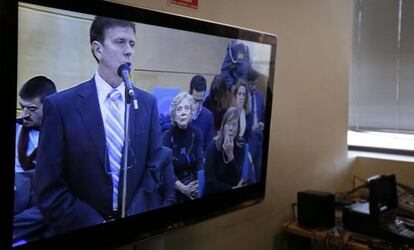Fuentes opens doping can of worms
Key Puerto suspect confirms he treated athletes from sports other than cycling

On the first day of testimony in the Operation Puerto case in Madrid, key suspect Eufemiano Fuentes uttered the words that Spanish and international anti-doping authorities had been anxiously waiting to hear: “In a personal capacity I worked with all kinds of athletes; cyclists, athletes, soccer players, tennis players and boxers.” Fuentes added that at no time were his services of “advice and preparation” sought by the teams or clubs of the sportspeople on his books.
The World Anti-Doping Agency had asked that the bags of blood seized by the Civil Guard in 2006 raids, which blew Puerto open, be handed over for their own examination into their exact intended use. Fuentes’ revelation is unlikely to stem the flow of WADA’s crusading zeal, but Judge Julia Patricia Santamaría delayed any decision on access. Judicial sources said that in all likelihood that decision will be included when she delivers her judgment, which is expected in mid-March, although it could also form the basis of a separate writ.
However, Santamaría denied prosecutors access to the files on Fuentes’ laptop as it would constitute a breach of privacy.
Fuentes, the first of the five suspects to take the stand, defended his actions on Tuesday by claiming that his work was based purely on watching the health of his clients. “I was concerned with protecting the hyperviscosity of their blood,” he stated. Fuentes testified that he had “never” performed a transfusion from one person to another, nor performed transfusions during a competition. He added that the transfusions of athletes’ own blood into the same veins were performed in hotel rooms due to the privacy concerns of the cyclists.
In reference to the system of coded labels on the blood bags, Fuentes stated that it was a case of “convenience” and the use of slang during conversations with his clients was due to “fear” that the press had hacked his telephone, “and not the Civil Guard,” because his business was legitimate.
Fuentes said that he treated athletes with low hematocrit or anemia by “carrying out periodic blood tests when they were preparing for a specific competition, to check on their preparation, make sure they were eating correctly...” His work, he said, consisted solely of monitoring levels of hematocrit in his clients because high percentages can lead to “cardiovascular and even renal problems.”
In other key testimony, Fuentes claimed that two suitcases full of drugs seized in a police raid on his consultancy in Alonso Cano street, Madrid, belonged to Alberto León, a former professional cyclist who committed suicide in 2011 after the Operation Greyhound investigation into doping in Spanish athletics came to light. León had worked for Fuentes as a messenger, a courier and in the act of cleaning the medical equipment after transfusions had been performed.
“In Alonso Cano there were no medicines. There were two suitcases that Alberto León brought and I assumed they contained clothes or personal effects, but I never opened them,” he said. Asked about a box of EPO found in the search, Fuentes said it was the only one he possessed and was used for treating his daughter, who was suffering from cancer and receiving a course of chemotherapy.
Judge Santamaría decided to add Tyler Hamilton to a witness list that already contains 35 cyclists, at the request of WADA. Hamilton, an Olympic gold medalist in 2004, testified before the United States Anti-Doping Agency in the investigation that led to Lance Armstrong’s lifetime ban and subsequent doping confession on the Oprah Winfrey Show.
Hamilton told USADA that while he was racing at CSC, in 2002, the team director sent him to Fuentes and during the next two seasons he followed “a regular program of transfusions.”
Fuentes and his four co-defendants face charges of endangering public health and could be sentenced to up to two years in jail if it is proven the cyclists’ health was put at risk through their alleged activities.
Tu suscripción se está usando en otro dispositivo
¿Quieres añadir otro usuario a tu suscripción?
Si continúas leyendo en este dispositivo, no se podrá leer en el otro.
FlechaTu suscripción se está usando en otro dispositivo y solo puedes acceder a EL PAÍS desde un dispositivo a la vez.
Si quieres compartir tu cuenta, cambia tu suscripción a la modalidad Premium, así podrás añadir otro usuario. Cada uno accederá con su propia cuenta de email, lo que os permitirá personalizar vuestra experiencia en EL PAÍS.
¿Tienes una suscripción de empresa? Accede aquí para contratar más cuentas.
En el caso de no saber quién está usando tu cuenta, te recomendamos cambiar tu contraseña aquí.
Si decides continuar compartiendo tu cuenta, este mensaje se mostrará en tu dispositivo y en el de la otra persona que está usando tu cuenta de forma indefinida, afectando a tu experiencia de lectura. Puedes consultar aquí los términos y condiciones de la suscripción digital.








































